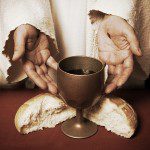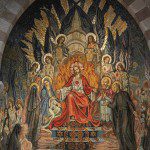Psalm 119:73-80
Your hands made me and formed me;
give me understanding to learn your commands.
May those who fear you rejoice when they see me,
for I have put my hope in your word.
I know, LORD, that your laws are righteous,
and that in faithfulness you have humbled me.
May your unfailing love be my comfort,
according to your promise to your servant.
Let your compassion come to me that I may live,
for your law is my delight.
May the arrogant be put to shame for wronging me without cause;
but I will meditate on your precepts.
May those who fear you turn to me,
those who understand your statutes.
May I wholeheartedly follow your decrees,
that I may not be put to shame.
I live and work in a mostly mainline Christian congregation that has a lot of trouble with the concept of God’s wrath. This plea from the psalmist expresses why I need to know that God will judge all of us one day: “May the arrogant be put to shame.” The word for shame in Hebrew is bosh. It can also mean “confusion” or “bewilderment.” I long for there to be a day when those who so confidently judge others and play cynical, self-righteous gotcha games all over the blogosphere find themselves speechlessly mortified before the throne of God. I don’t need to see them flogged or burning in a lake of fire. I just need to know that the arrogant will be put to shame, whatever that looks like.
I’m tired of the arrogant winning. I’m tired of this spin-doctored world in which you can make lies true if you just repeat them long enough. So the thought that one day God will tell arrogant people to shut up and sit down when they try to offer smug analyses of stock market crashes or riots in London is comforting to me. Even if I’m one of those arrogant people (which I often am).
The psalmist realizes that he needs God’s help avoiding arrogance. He says to God, “in faithfulness you have humbled me.” The word for humbled is anah which also means “afflicted” or “compelled to answer” as I discussed in my last monster-psalm meditation. I’m not sure about the relationship between bosh and anah, because the psalmist definitely doesn’t want to be “put to shame,” but he wants to be humbled. Perhaps being humbled means receiving God’s correction of our arrogance in a positive way rather than being shocked and hurt by it.
In any case, I’ve been reading Tim Keller’s book Prodigal God about the story of the prodigal son and his self-righteous older brother. Keller argues that Jesus redefines sin through this parable, saying that sin is not so much a question of breaking the rules as it is glorying in ourselves whether that translates into the prodigal son’s selfishness or his older brother’s self-righteousness. It’s interesting how in this psalm, the law serves the purpose of humbling the psalmist. Being humble is more the goal than being correct. May the arrogant be put to shame so we will learn that in faithfulness God has humbled us!











